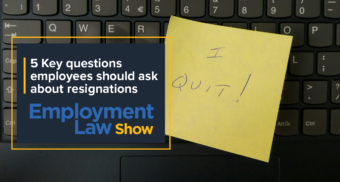What your employer legally can’t do Part 2 | Employment Law Show TV – S5 E30
Episode Summary
WHAT YOUR EMPLOYER LEGALLY CAN’T DO PART 2, fired for cause, mental health leave, and more on Season 5 Episode 30 of the Employment Law Show with employment lawyer Lior Samfiru, Partner at Samfiru Tumarkin LLP.
Watch above to discover your workplace rights and learn everything you need to know about employment law in Ontario, British Columbia, and Alberta, on the only employment law show on both TV and radio in Canada.
Episode Notes
COVID-19 Vaccinations and employee rights
Vaccinations are becoming a common concern, particularly whether or not an employer can mandate COVID-19 vaccinations. Can employers force employees to be vaccinated?
Employers generally cannot force an employee to be vaccinated. There are a few situations, such as a long-term care home, in which employees might be told to be vaccinated. Employers can ask an employee whether or not they have been vaccinated in regards to possible accommodations, but not as a means to penalize an employee.
LEARN MORE
Can my employer force me to be vaccinated?
Lior Samfiru on COVID-19 vaccines and employee rights
Segment starts at 1:45
CALL: Terminated due to COVID-19 and offered less severance
I was let go from my job selling educational technology to schools after the pandemic hit. They weren’t clear about their reasons for termination, but COVID-19 has hurt sales a bit. They gave me 2 weeks’ pay after 2 years on the job. Are they allowed to do that?
Employers are permitted to let an employee go for any reason as long as adequate severance is offered, and the reason for termination was not discriminatory. Employees are often not offered their full severance entitlements. Severance is based on a number of factors, including the age of the employee, the length of employment and position.
Segment starts at 5:51
Fired for cause for due to a failure to perform
I was fired after I was unable to bring up my department’s performance over the past two months, despite the pandemic and my best efforts. Even after 7 years with the company, I was told that I’m not owed severance because I failed to meet their benchmarks. Is that right? I’m 55 and never signed a contract.
Employers cannot fire an employee for cause due to a performance issue. It is typically very difficult to terminate an employee for cause, as there has to be proof of an escalation in misconduct of the employee, and that there are no other options other than termination. Employees who do not agree with criticism should express their concerns in writing.
Segment starts at 8:13
What your employer legally can’t do – Part 2
1️⃣ Force you to accept a new employment contract
Employment contracts typically drafted in order to benefit an employer and often seek to limit an employee’s rights. A new employment contract could limit an employee’s rights to severance, change compensation, or more, and should not be signed without first seeking legal advice.
Segment starts at 12;28
2️⃣ Treat you like a contractor when you are actually an employee
Employees are often misclassified as contractors when they are in fact employees. Employment law determines whether or not an individual is an employee, not an employer. Individuals who are misclassified as a contractor do not have access to overtime pay, severance, sick days, etc.
Segment starts at 14:26
3️⃣ Withhold pay or take money from your paycheque
Employers cannot reduce compensation or deduct from an employee’s pay without an employee’s consent. Employees who feel their employers are deducting pay can file a complaint with the Ministry of Labour.
Segment starts at 15:54
4️⃣ Fire you for cause if you haven’t committed serious misconduct
It is difficult to terminate for cause, however, employers often assume they are within their rights to do so. Termination for cause occurs when an employee’s future employment is no longer possible to due serious misconduct.
Segment starts at 17:37
5️⃣ Discriminate against you in the workplace
Employees have the right to work in a harassment and discrimination-free workplace. Employees who feel they have been discriminated against or harassed at the workplace have had their human rights violated and there can be serious repercussions for the employer.
Segment starts at 18:51
6️⃣ Give you less severance than what the law says you are owed
Employers often offer employees the minimum severance entitlements and are unaware of an employee’s entitlements. Before agreeing or signing a termination release should contact an employment lawyer in order to determine whether or not their severance package is fair.
Learn More
Severance Pay in Ontario
Severance in BC
Severance Pay in Alberta
Segment starts at 19:57
CALL: Asking for an update on employee’s mental health leave
An employee has been off for a week to deal with panic attacks. As the week comes to an end, do I have the right to ask her for an update on her status?
Employers are within their rights to ask for updates from their employees who are currently on leave, as well as a doctor’s note and possible accommodations. Employers cannot ask an employee for personal information regarding their diagnosis.
READ MORE
• Sick Notes for Ontario employees
• B.C. employees and sick notes
• Alberta employers and sick notes
Segment starts at 21:18
CALL: Significant decrease in salary and severance
My employer wants to transfer me to accept a new contract for a different job within the company. My pay will drop from six figures down to under $100,000. I’ve been there for 8 years. How will this affect my severance pay?
Employers do not have the right to force employees to accept a significant change to the terms f their employment, such as a pay reduction. A significant change to the terms of employment can lead to a constructive dismissal. A decrease in salary, upon termination, will result in a decrease in an eventual severance entitlement.
Segment starts at 24:30
A refusal to accommodate by an employer
I have submitted multiple email requests to HR for accommodation due to a medical condition. The company hasn’t responded to any of them or my follow-up calls. However, my manager has just requested a morning meeting next Thursday along with a member of HR. Should I be worried?
Employers have a duty to accommodate an employee’s medical condition and should be following their doctor’s recommendations. Terminating an employee due to a medical condition is illegal and is a violation of the employee’s human rights.
Segment starts at 27:18
NEXT EPISODE: Employment Law Show S6 E01 – 5 things to know if you’re returning from remote work
PREVIOUS EPISODE: Employment Law Show S5 E29 – The Truth about Independent Contractors




